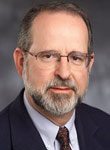DiSalvo reappointed head of sustainability center
By Krishna Ramanujan

From funding "green" research to connecting sustainability researchers with diverse specialties, the Atkinson Center for a Sustainable Future (ACSF) has had a successful first five years.
Its director, Frank DiSalvo, the J.A. Newman Professor of Chemistry and Chemical Biology, has been reappointed to a three-year term effective July 1, 2012.
"Frank DiSalvo and the Atkinson Center are fully engaging the remarkable expertise amongst Cornell's faculty, staff and students to assemble and grow an exciting and ambitious program in sustainability that will be uniquely identified with Cornell and have an enduring effect on our collective consciousness for all things 'sustainable,'" said Robert Buhrman, Cornell's senior vice provost for research.
The Atkinson Center, which in 2011 received an $80 million commitment by David R. Atkinson '60 and his wife, Patricia, nurtures multidisciplinary research and cultivates collaborations on sustainability across campus and beyond.
"For starters, we convene and connect," said DiSalvo. "Cornell is a big place, so it's easy for researchers to work on similar things and not know each other." One popular ACSF program, the topical lunch, has engaged 1,350 participants in 76 lunches. These lunches often serve as a starting point for faculty to form new teams around a common theme. Past topics have ranged from global water shortages to sustainable buildings and communities to connections between disease and climate change.
In just five years, the center's list of faculty fellows has grown to 315 from 65 departments. Faculty members are invited to become fellows after engaging with ACSF and/or Cornell sustainability research.
In addition, the center incubates and seeds innovative multidisciplinary projects that advance sustainability in areas of energy, environment and economic development. "We have programs that support initial activities where researchers from different disciplines are engaged in solving problems as a team," said DiSalvo. The center's flagship annual research program, the Academic Venture Fund, has seeded 45 awards, amounting to $3.6 million for sustainability research. Every dollar the center spends on faculty-led initiatives has an average return on investment of $10. DiSalvo attributes that success, in large part, to the fact that Cornell houses the three Es -- energy, environment and economic development -- under one roof. "This is a new way of doing things at a university" that makes Cornell unique, DiSalvo said.
The center played a role last year in hiring such sustainability-minded researchers as Howard Chong in the Hotel School and Shanjun Li in the Charles Dyson School of Applied Economics and Management. Both are assistant professors whose work focuses on environmental and energy economics.
Beyond Cornell, the center has developed partnerships to leverage impact and scale-up solutions. For example, the university's partnership with the global humanitarian organization CARE links Cornell research with CARE's on-the-ground staff in 70 countries to find solutions for world hunger and climate change. And a recent project funded by a $5 million gift from philanthropist and energy expert Yossie Hollander has combined soil scientists, engineers and economists to develop a sustainable power source to fuel a rural Kenyan village using locally sourced organic waste.
An important focus of the center's mission is communicating sustainability to the public. "The biggest challenges have been around communication, because you have to tell your stories many times before people get it," DiSalvo said.
"This is our fifth year since my initial appointment and in that short time, ACSF has been even more successful than expected, due to broad support across the university and by being in the right place at the right time. The prospects for continued growth and impact are exciting," DiSalvo said.
DiSalvo received his Ph.D. in applied physics from Stanford University in 1971. He is a member of the National Academy of Sciences and a fellow of the American Association for the Advancement of Science, American Academy of Arts and Sciences, American Physical Society and the American Chemical Society.
Media Contact
Get Cornell news delivered right to your inbox.
Subscribe